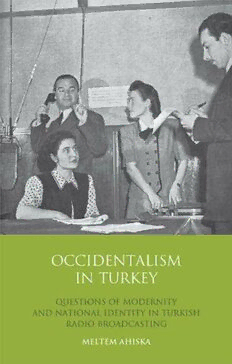
Occidentalism in Turkey: Questions of Modernity and National Identity in Turkish Radio Broadcasting PDF
141 Pages·2010·17.759 MB·English
Most books are stored in the elastic cloud where traffic is expensive. For this reason, we have a limit on daily download.
Preview Occidentalism in Turkey: Questions of Modernity and National Identity in Turkish Radio Broadcasting
Description:
From the early Attaturk years, Turkish radio broadcasting was seen as a great hope for sealing the national identity of the new Turkish Republic. Since the inaugural broadcast in 1927, the national elite designed radio broadcasting to represent the "voice of a nation." Here Meltem Ahiska reveals how radio broadcasting actually showed Turkey’s uncertainty over its position in relation to Europe. While the national elite wanted to build their own Turkish identity, at the same time they desired recognition from Europe that Turkey was now a Westernized modern country. Ahiska shows how these tensions played out over the radio in the conflicting depictions and discrepancies between the national elite and "the people," "cosmopolitan" Istanbul and "national" Ankara, and men and women (especially in Radio drama). Through radio broadcasting we can see how Occidentalism dictated the Turkish Republic’s early history and shaped how modern Turkey saw itself.
See more
The list of books you might like
Most books are stored in the elastic cloud where traffic is expensive. For this reason, we have a limit on daily download.
